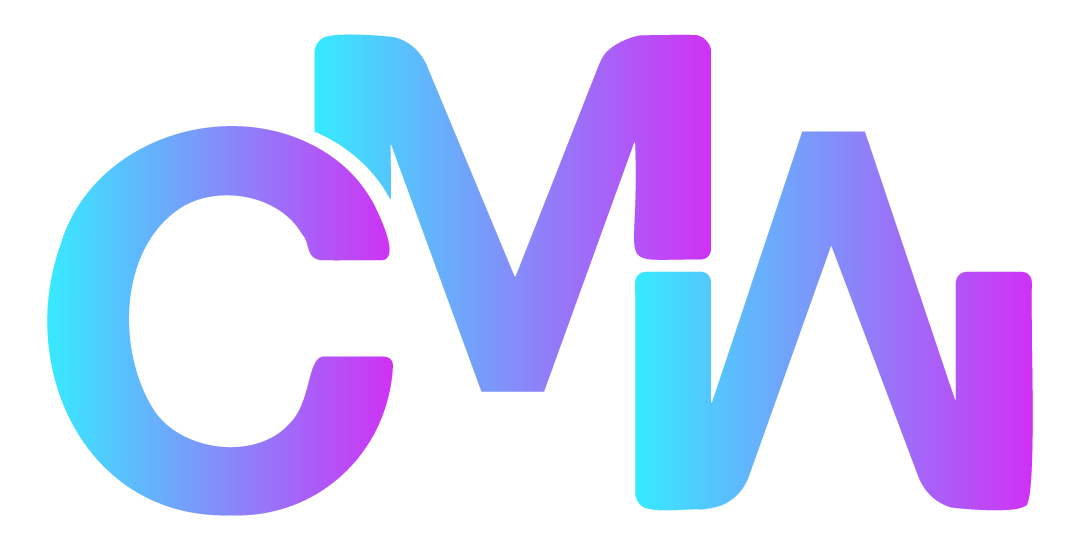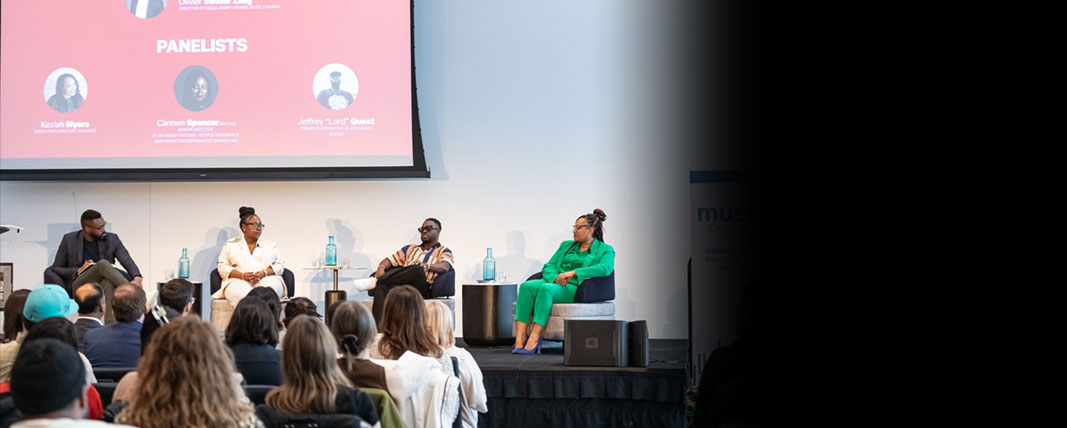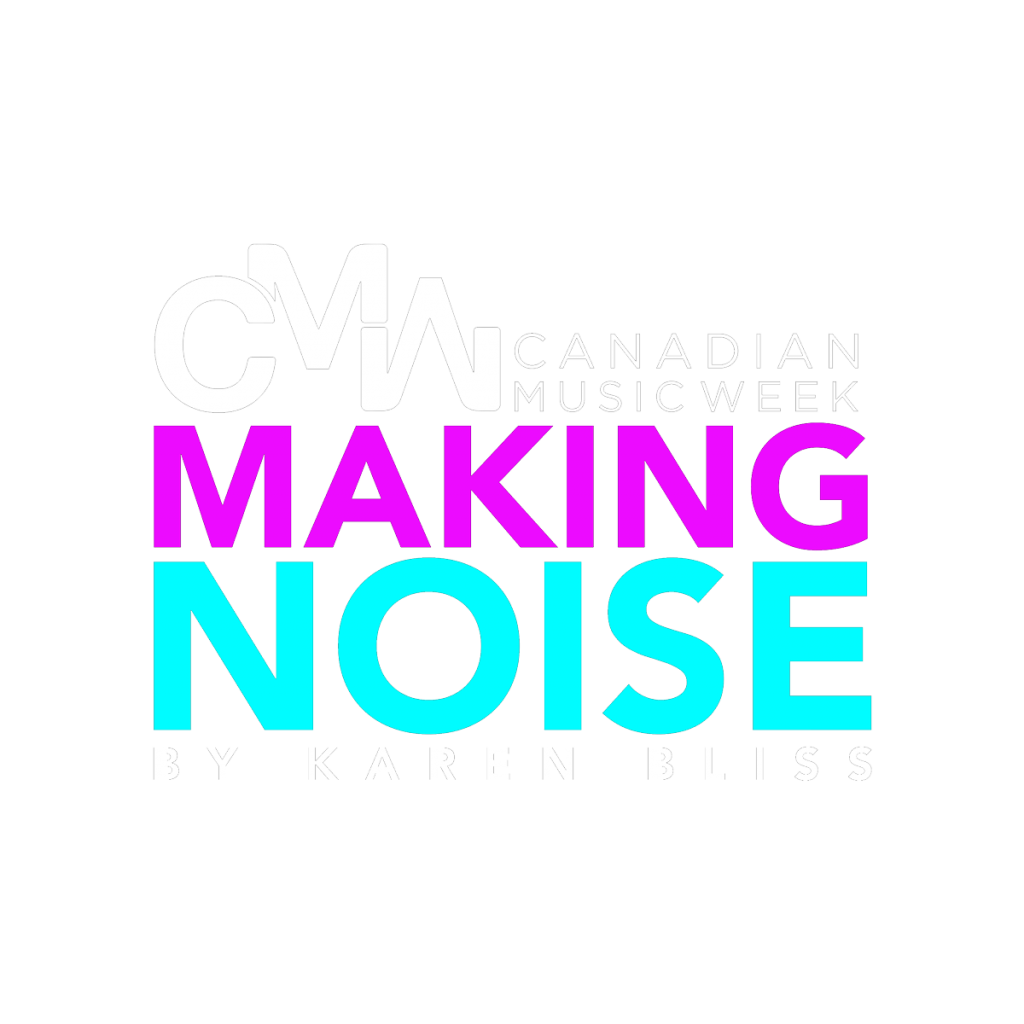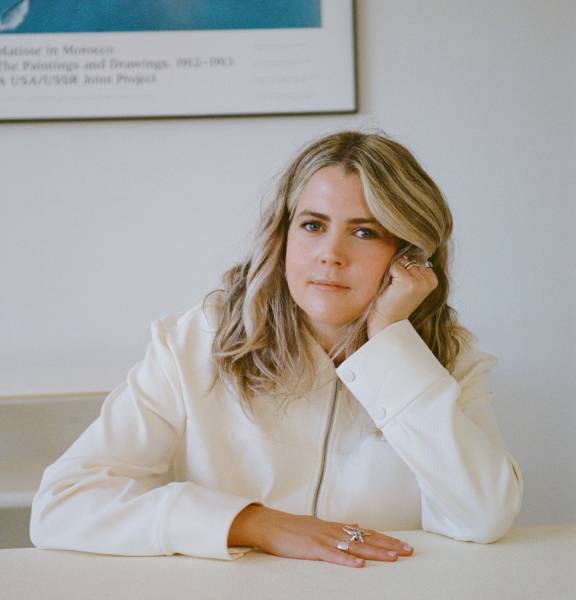
BY KAREN BLISS
Advance, Canada’s Black Music Business Collective, headquartered in Toronto, launched in the summer of 2020 to lead “the change in developing an infrastructure for the betterment, upliftment and retention of Black people in the music business.”
Co-founded by Vivian Barclay, managing director, Warner Chappell Music Canada; Craig Mannix, vice-president, Black music, Universal Music Canada; and Miro Oballa, partner, Taylor Oballa Murray Leyland LLP, Advance is helmed by executive director Keziah Myers, who oversees the implementation of its education and networking programs, ongoing advocacy, as well as the online resources and job board. The three founders sit on the board.
That year, in a partnership between the City of Toronto and the Slaight Family Foundation, Advance was given $2 million over four years to “advance” its mandate, four pillars of action: research, advocacy and government partnerships, mentorship and education, community outreach, and business development and entrepreneurship. Advance also receives annual financial support from Ontario Creates and Music Canada.
In three short years, the organization has kicked open some doors in the Canadian music industry with open dialogue, statistics and a strategy. They have more than 900 members, have shared over 630 job postings and facilitated more than 200 job opportunities for its members.
They have also assembled regional advisory committees in British Columbia and Quebec and held discussions in almost every province (and hope to get to the territories).
Advance’s programs include the job fair Advance Career Employment Day (ACED); Advance Career Expo; Amped, the educational podcast series Amplify; and, significantly, the implementation of the nine-week Music Discovery Course with the Toronto District School Board and the Centre of Excellence for Black Student Achievement, which is also now being offered by the York, Peel and Halifax district school boards.
Myers also shares her role at Advance and advocacy work with audiences outside of the music industry, such as speaking at Meeting Professionals International (MPI) and Unblock, which is focused on diversity, equity and inclusion in the food, drink and hospitality industry. She also spoke at the Ontario Association of Children’s Aid Societies’ PowerUp! Youth Symposium for Black-identifying children and youth actively involved with child welfare.
Among the highlights of 2023, in March Advance held the Be The Change panel at Juno Week in Edmonton, well attended by industry and artists. In April was the second Inside Live, a three-day experiential program designed to expose Black high school students and their parents to the multiple career pathways that exist in the live music industry: On April 1 students attended the MLSE LaunchPad; April 6 were at the venue History for the DSVN concert, and April 15 had an online career mapping session. And in May, Myers and Advance was profiled in the Globe and Mail. This summer, Advance will film season two of Amplify, which runs as both a docuseries and podcast, to debut in September.
Karen Bliss spoke Myers about Advance, its history, unique programs and progress.

What is the mandate of Advance and why was it created?
The mandate of Advance is to ensure that we are looking at Black music business professionals in the music industry and elevating them, empowering them, and, ultimately, encouraging them to stay within the business side of the music industry. And when I say the business side of the music industry, I’m speaking about infrastructure, support roles, administrative roles, anything essentially that’s not the creative, to put Black professionals in those spaces.
The reason that it was created was because we recognized that the stage was really diverse; there was a lot of Black representation, and there always has been as far back as you can think. When you think about popular music, you think of people who are Black, people who have been on those stages, or who have been behind the scenes writing the music. But when we think about the infrastructure and the decision makers, we don’t see that same representation. So, we thought it was really important to do that so that the industry — those who are supporting the creatives — are representative of the people that they’re working for and representative of the population at large.
When you talk to or looked at similar organizations around the world, are they expressing the same problems with lack of diversity, infrastructure, and support that we have here in Canada?
Absolutely. In some cases, to a greater extent; in some cases, to a lesser extent. So, if you look at BMAC, which is the Black Music Action Coalition in the U.S. they are seeing the same problem. What they are looking at is to increase those numbers, even though their numbers are much better than ours. When we talk about numbers, the ratio between the Black professional within the music industry and the non-Black professional in the music industry, their ratio is a lot higher than ours. There’s definitely more Black professionals represented in that space. They’re often looking at empowerment and encouragement and recognition of the Black professionals. So, there’s that side.
And then you look at another organization that is run by Ben Wynter in the U.K., under PRS [for Music Foundation], which is an organization very similar to Advance. They’re looking at increasing the number of Black professionals and highlighting the Black professionals that are behind a lot of these Black creatives. An example would be, just recently, that particular organization wrote an open letter to the industry about someone who was in blackface and why that was wrong. From a Canadian perspective, I can speak to the fact that when we in Canada do export missions or we’re working with the U.K., I have heard out of the mouths of industry here in Canada that there are no Black executives or business people on the infrastructure side working within the UK.
You can’t speed up progress. It’s very hard. But we can try. Over decades, there have been very few Black executives or even in mid-level positions. To me, there’s two main issues. One, recognizing and promoting Black staff to executive positions and putting policies in place, even if you’re a small business, to make that possible. But then the other issue — and this is in general — is providing structure, stability, mentorship, and a living wage to encourage young people to not only enter the music business but stay in it. Firstly, for those already in the industry, doing well in their job but not seeing anywhere to go, how are you dialoguing with the businesses to try and help Black people move up in the workplace?
We have lots of dialogues and conversations across the industry. It starts with education. It starts with the businesses recognizing that there has either systemic barriers or there’s been unconscious bias or prejudice that has stopped someone from being promoted or getting to the next stages of their career. There’s a concept called the mini-me syndrome [unconscious bias by an executive or a person in a management role to favour someone more like them, usually race and gender], and it permeates the Canadian music industry. I’ve seen it firsthand the entirety that I’ve been in this field.
It’s essentially when you have someone who sees someone else that looks like them or reminds them of themselves when they were younger, and then that person attaches themselves to that version of their younger selves, and either lives vicariously through or mentors them in a way that pushes them further or gives them insight to understand the ropes. You’ll see this with a lot of white men who came up by the bootstraps. They manage some really big names, and then out of a music school they see someone who reminds them of the energy that they have. There’s nothing wrong with being attracted to someone who you see as a top performer; the problem comes when the top performers all look the same. And so the white man who is like, ‘That person really reminds me of me out of school,’ and the next person, ‘Oh, that person reminds me of me,’ they all end up being white younger boys who are given these opportunities that are not necessarily spread out and given to other people. So the first thing is identifying that because most people don’t realize that that’s what they’re doing.
It’s a common phrase, and viewed as a compliment to say, “You remind me of me when I was young.”
Exactly. And when they say that, we need to put vehicles in place to not deter the person from doing that, but to say, “Okay, well who else are we seeing with that really cool energy? Oh, a Black woman; oh, a differently abled person who’s also Black. Okay.” What we’re doing now is we’re recreating equity.
What has been the response? Have you got pushback?
We haven’t gotten pushback because it’s relatively new to them looking at it through this lens. If anything, they’re saying, “Oh man, I didn’t even realize that I was doing that.” So where Advance comes in is I help to highlight those people. As an example, if you have someone at one of these businesses that is working within your infrastructure and they are doing great work, I can go to the business and say, “Hey, did you know that so-and-so is doing this?” or “Oh my goodness, this person is a superstar because…” And the names that are coming out of my mouth are Black professionals. And then that gets the business to say, “Oh yeah, true. I didn’t even notice.”
As an example, myself, when I was at [performing rights organization] SOCAN, I changed the entire trajectory of the way money comes into SOCAN. For the most part, money is going out by way of royalties, but there are unique scenarios within SOCAN where SOCAN members are paying into SOCAN because they want access to SOCAN houses. At one point, it was a system that just wasn’t efficient, and it probably was key to opening up the business to a lot more headache than they needed and I changed that entire process, which essentially affected 175,000 members. Then I went over to licensing and I gave them this exact same scenario. I pushed it through finance and it affected all 100,000 licensees. So it’s 275,000 people affected. And when I got to my performance review, my boss didn’t even know that I had done that.
There’s seems to be a time when mentorship stops because of age and you are on your own within these organizations to keep up, to learn about everything from leadership to new technologies. Mentorship is viewed as something offered to the young, when others might need it. What is a reasonable expectation for someone within some of these big companies, whether it’s radio, a label, publishing, whatever it might be, to expect to be promoted, or if they’re not, what can they do to demonstrate they want to be considered or add that extra skill that they might need in order to throw their hat in the ring?
I love that question. Because there’s so much about you, as a person, and getting out there and learning. Promotions don’t just come because you sat at your desk for 10 years. That’s just not how it works. Mentorship does have this weird stop space. But I don’t think that that’s necessarily the same for Black people because they themselves haven’t been able to get mentorship anywhere. So they may be getting mentorship 10 years into a role. Now they’re actually finding someone who they can relate with that can help them to the next stage because they really don’t know what the next stage looks like.
There’s always value in continuing to have people you can lean on and remembering that those people don’t have to look like you. Again, from personal experience, my mentors haven’t looked like me because, in reality, there’s not very many that do look like me. But I’m in a different space now. I’ve made opportunities for new mentors to come in and they relate to me and they’re probably mothers. You do need to know that there’s a lot more to learn.
It must be an unspoken mentorship because I wouldn’t want to insult someone by offering to be their mentor if they’ve been in the business a decade?
I changed the word from mentorship to just relationship. The mentors that I have right now, I know that they’re mentoring me. Did I ever ask them to mentor me? No, I didn’t. I’ve built a relationship with them and then when I have questions, or when I need to talk through something, I call them.
Some people say they are open to mentoring but don’t follow through. They are busy or protective of their jobs.
I think the difference, in this case, as Black people who have been in the industry for a long time, when we’re confronted with an opportunity to mentor, we, especially because we’re Black and we know what it has felt like, we don’t give lip service because we know how valued our experience is to the person who we’re talking to. There’s also a weight there. It’s an interesting weight that sits on my shoulders if I don’t get back to someone who I said I would get back to from a mentorship perspective.

Let’s talk about young people and encouraging them to come into this incredible industry. It’s very hard to make a living. Is Advance working with schools or doing outreach anywhere else to encourage people to get into the music business and stay in it?
We have three programs right now that are specifically focused on pipeline. The organization supports music business professionals, but also create music business professionals.
We have the [Advance Industry] Music Discovery Program, which runs through the Toronto District School Board, then Peel District School Board, the York District School Board, Waterloo Region District School Board, and it will be a part of the Junos in Halifax [March 20-24, 2024] where we are the educational pillar for the Junos. And we’ll be executing the music industry discovery program there too. This is a program specifically for grades 11 and 12 students who identify as Black. They go through an eight-week course that also has a mentorship component. Every other week they will receive theory on various aspects of the industry.
What we do is we aligned the Ontario curriculum with roles within the music industry. As an example, everybody up until grade 12 has to take English. So we look at English and we say, “This is where English has the potential of getting you — it potentially can get you into music journalism and potentially can get you into being a marketing manager.” And we bring in an expert to talk to the high school students, and then the second week they do an activity with that same facilitator or mentor, and they’re mentored. So it happens every other week.
We also understand that Black students, still today, are streamed into lower capabilities and they’re not necessarily challenged in the ways that they should and could be. So there are a lot of Black students that are told, “You can only do things with your hands; go into this program,” and you end up becoming someone who works with their hands with no thought of going to college and university. In the music industry, the great thing is we have an entire space in live [music industry] that is all focused on skills and apprenticeship. So we bring in an expert who talks about everything from rigging to light to sound to live sound engineering We put through up to 25 students per session. So that’s one program.
The second program is Inside Live, which is with MLSE [Maple Leaf Sports & Entertainment], Live Nation, and [Serena Ryder and her manager Sandy Pandya’s] ArtHaus. This takes Black students who have never been to a concert before and takes them to a concert at a Live Nation venue at [MLSE venues] Budweiser Stage. Scotiabank Arena or History. The first one we did was Jessie Reyez. We took them to her concert, alongside their parents. When we talk about pipeline development in the Black community, it’s very important to recognize that the Black parent typically will say, “Don’t go anywhere near the music industry because a) they don’t know that there are careers within it where you get full-time jobs, and, b) there’s been negative experiences where music has been exploited, and has disadvantaged Black people, like in the case of writer Chuck Berry and Elvis.
So students come with their parents. They go through an accelerated program where they learn specifically about live and all of the careers within live. The second day they go to the show; they do a tour of the venue; they meet some of the crew and they meet the heads of the various areas, then they do career mapping at the end to say what was really exciting to you and where would you like to go? Those students are put within a group because they’re all over 16. So when the jobs come out from Live Nation or MLSE for crew and festivals in the summer, these students can now apply to be an employee.
The second iteration of Inside Live again featured professionals from Live Nation and ArtHaus. We had the learning day led by MLSE staff, and then on show day we met the DVSN team, including tour manager Ricki Belzadeh and Live Nation LA marketing rep Malcom Gray [marketing and partnerships director]. For 100% of the students, this is was their first concert ever, and for 100% of the parents this is the first time they have envisioned a sustainable career path for their child. Next iteration is scheduled for the fall.
What can the non-Black reader of this piece do to help Advance?
It seems obvious, but the reader can always look around their table or their space and think about who they’re not seeing. Sometimes that’s hard because our unconscious bias gets in the way and we don’t realize who we’re not seeing.
Can they reach out to Advance and say, “I have this position I need filled?”
Yep, absolutely. We have the job recommendation process, so anybody can reach out to Advance and that goes under job request. And they can reach out to Advance to walk through what inclusivity looks like and what belonging looks like. It’s not always that there’s not a Black person in the room, it’s if they felt empowered and encouraged to be able to speak up and say something. So as we continue to place Black people within these spaces, how are you empowering them to get to the point of getting those promotions and how are they feeling about speaking up without the fear of being reprimanded or losing their job?

